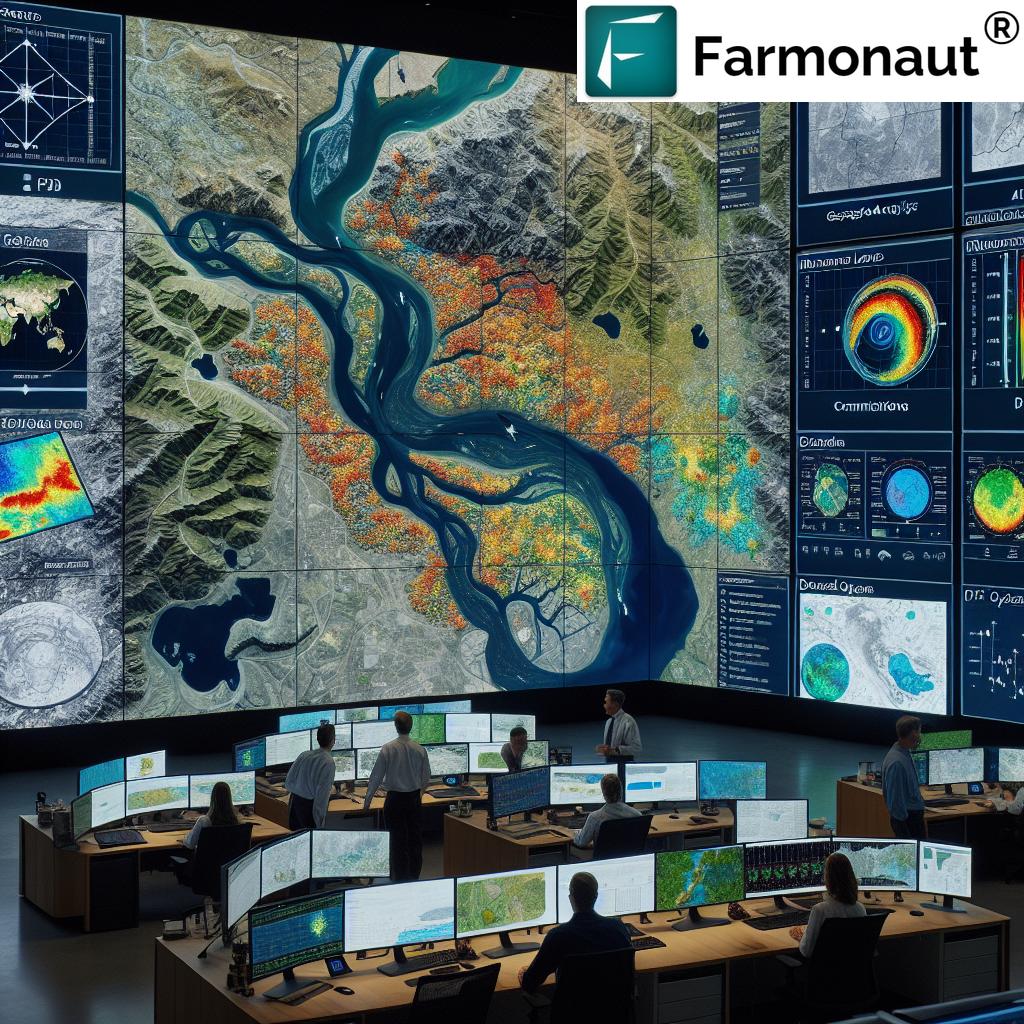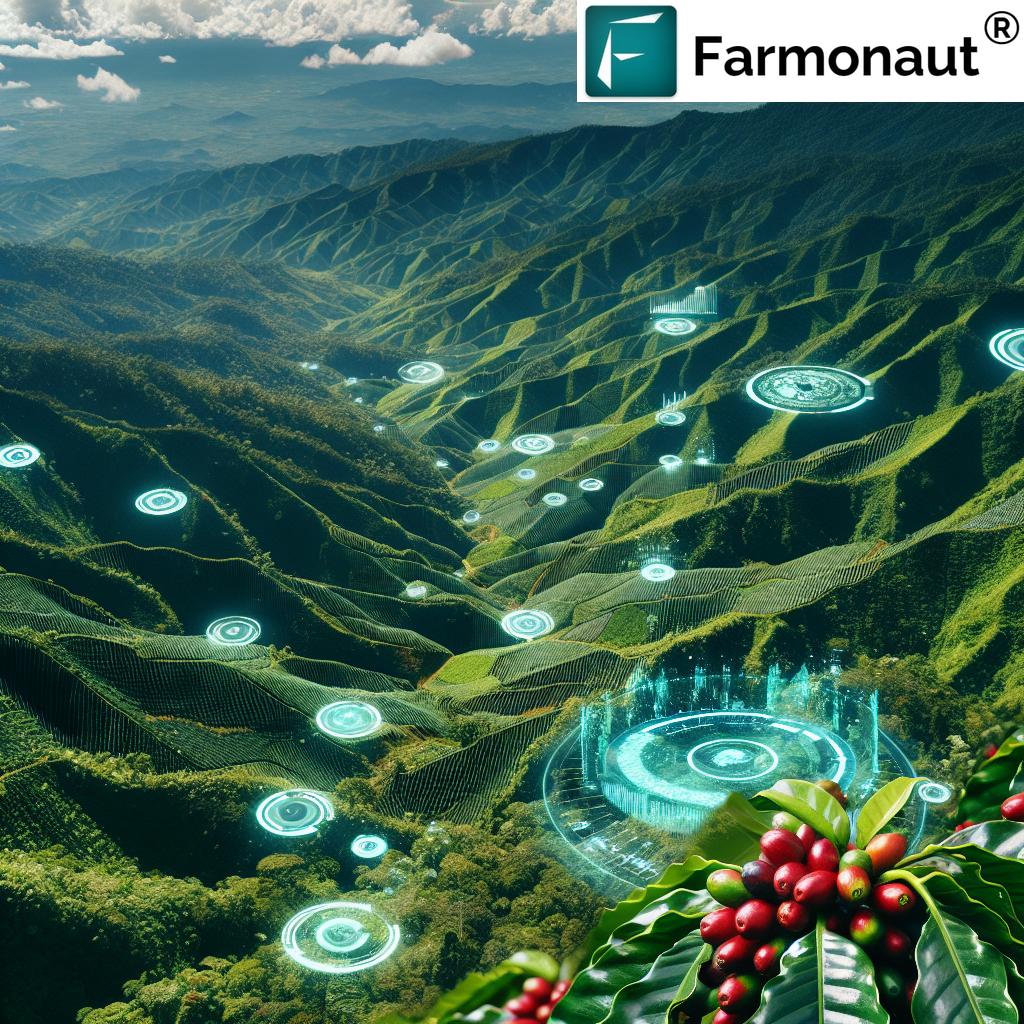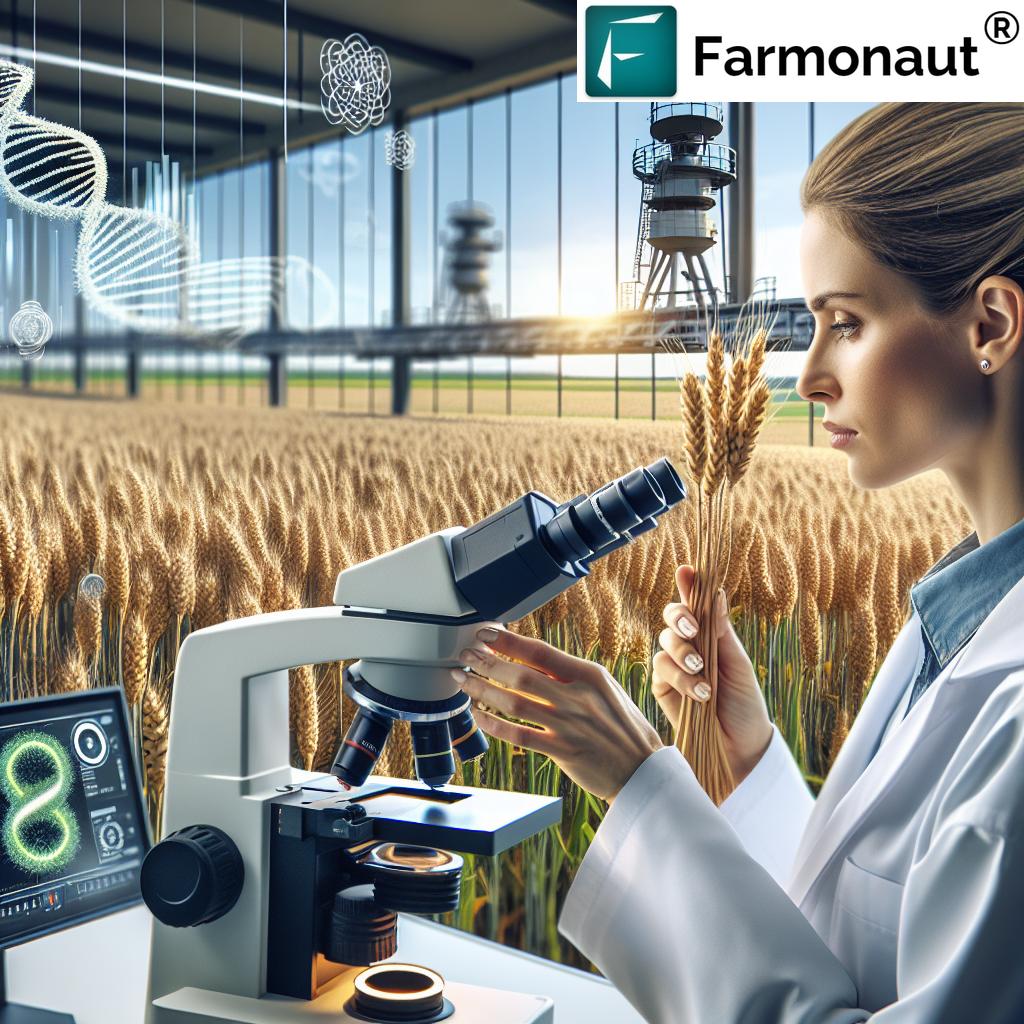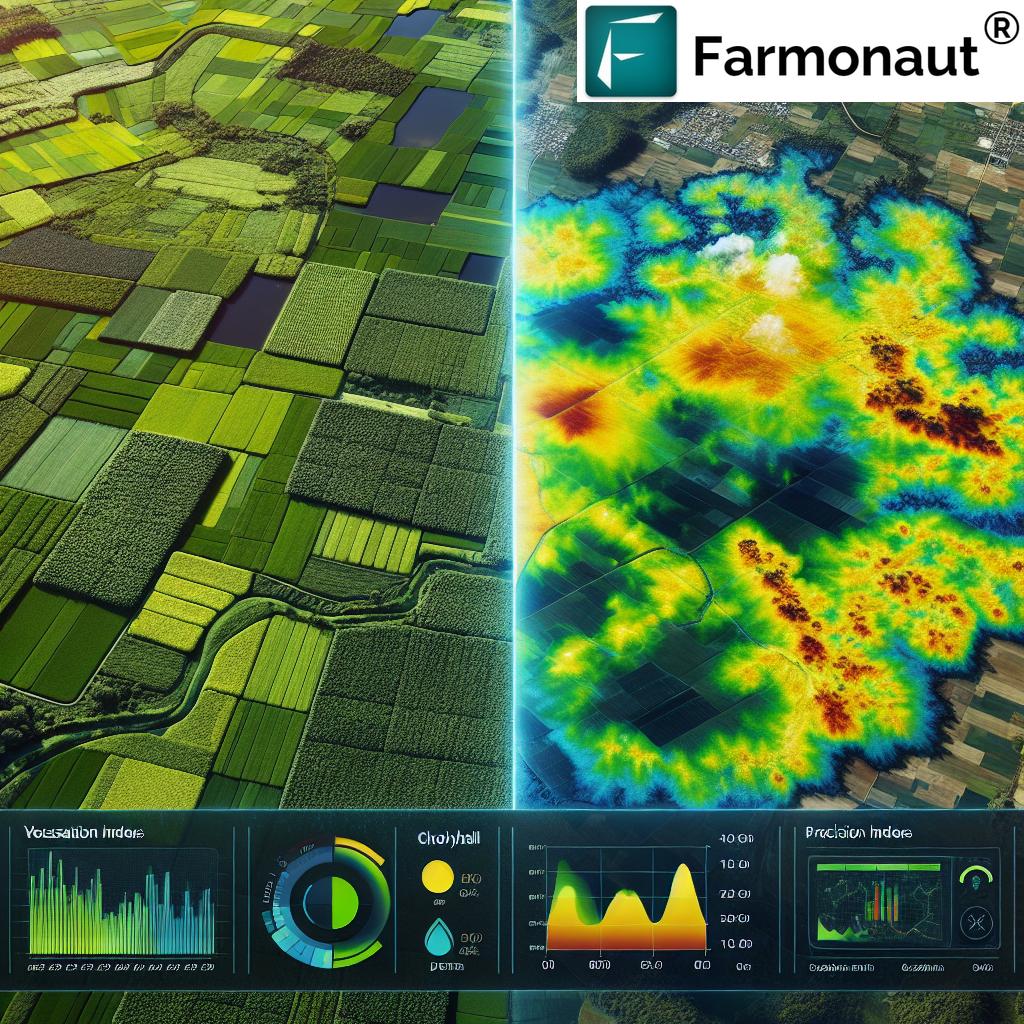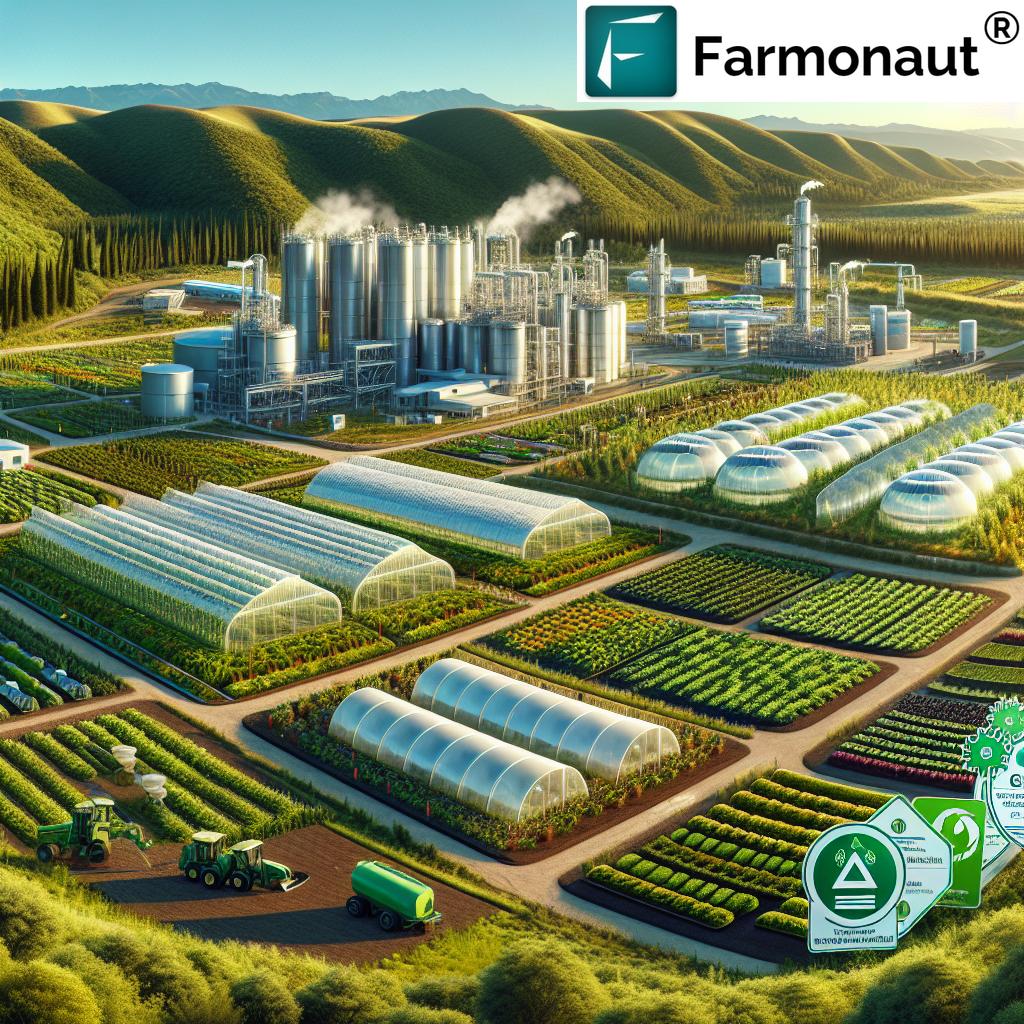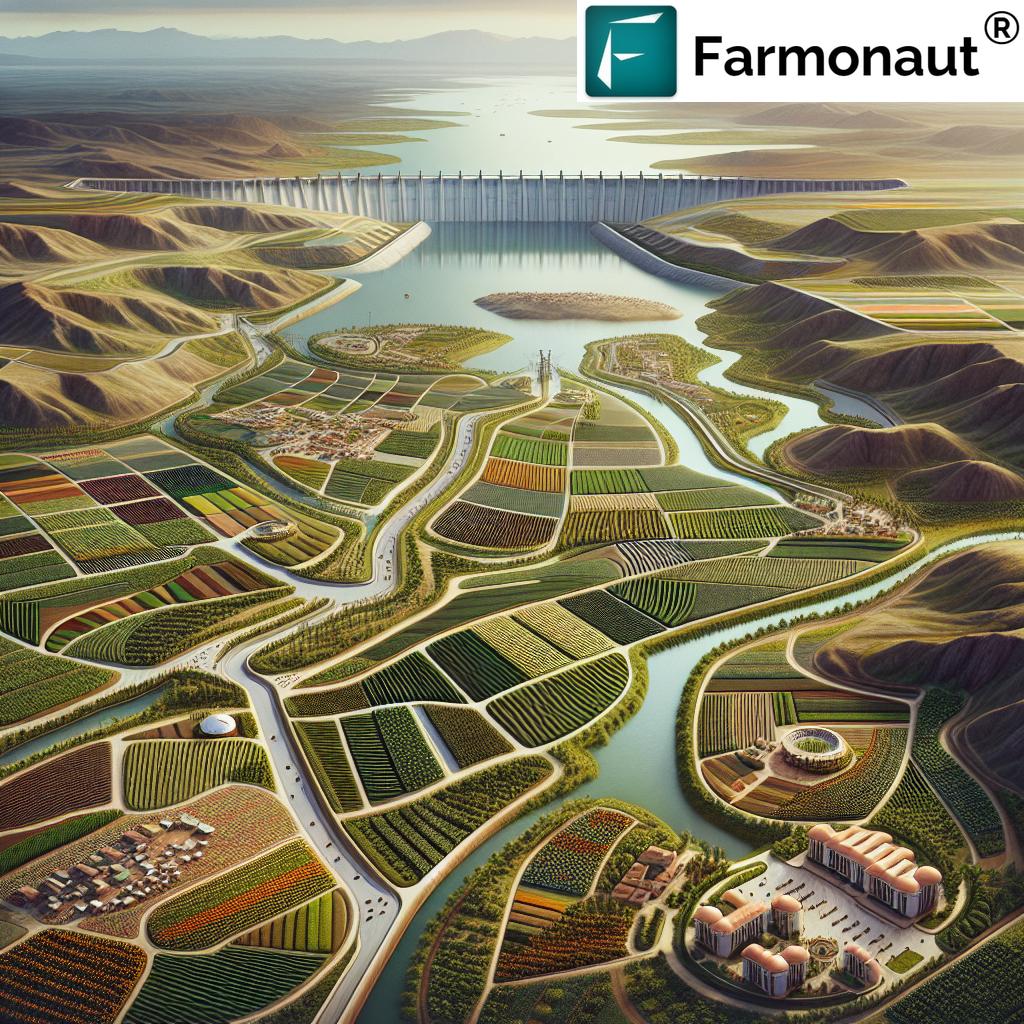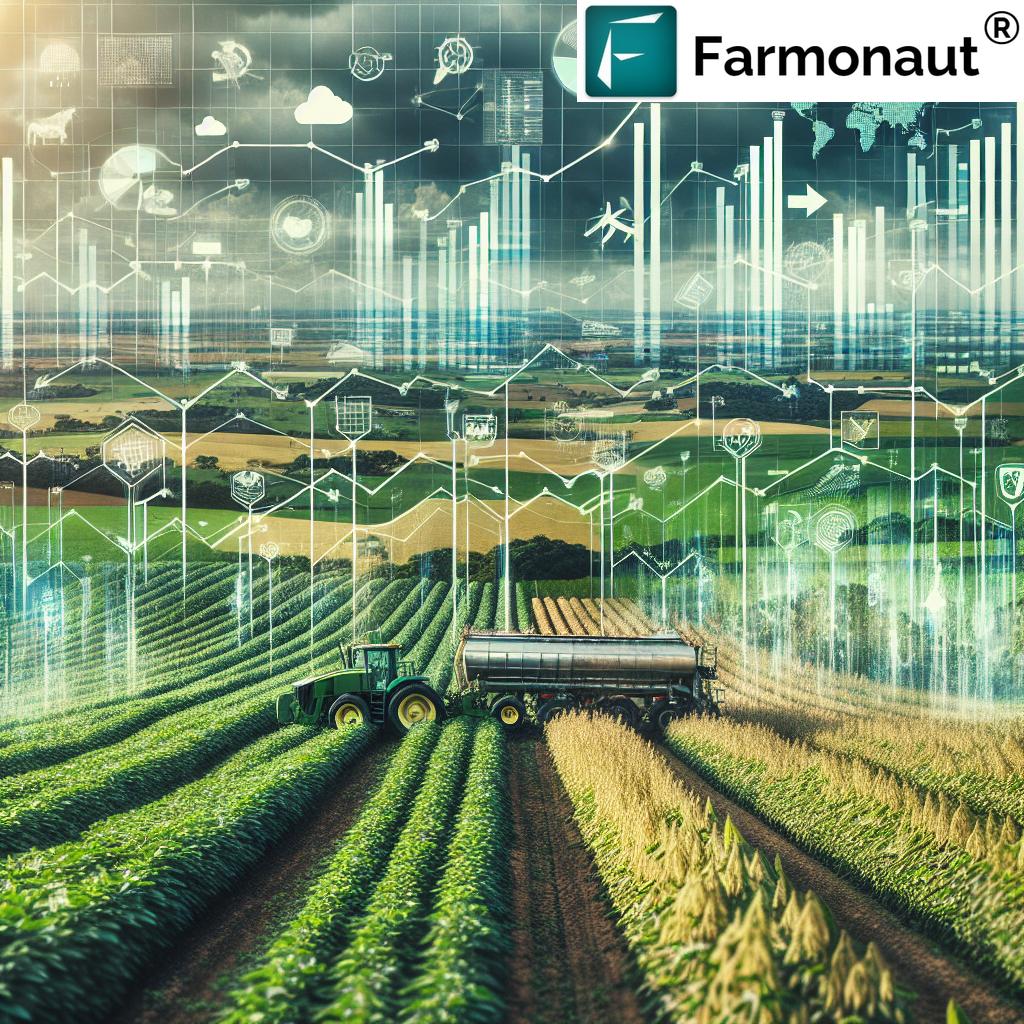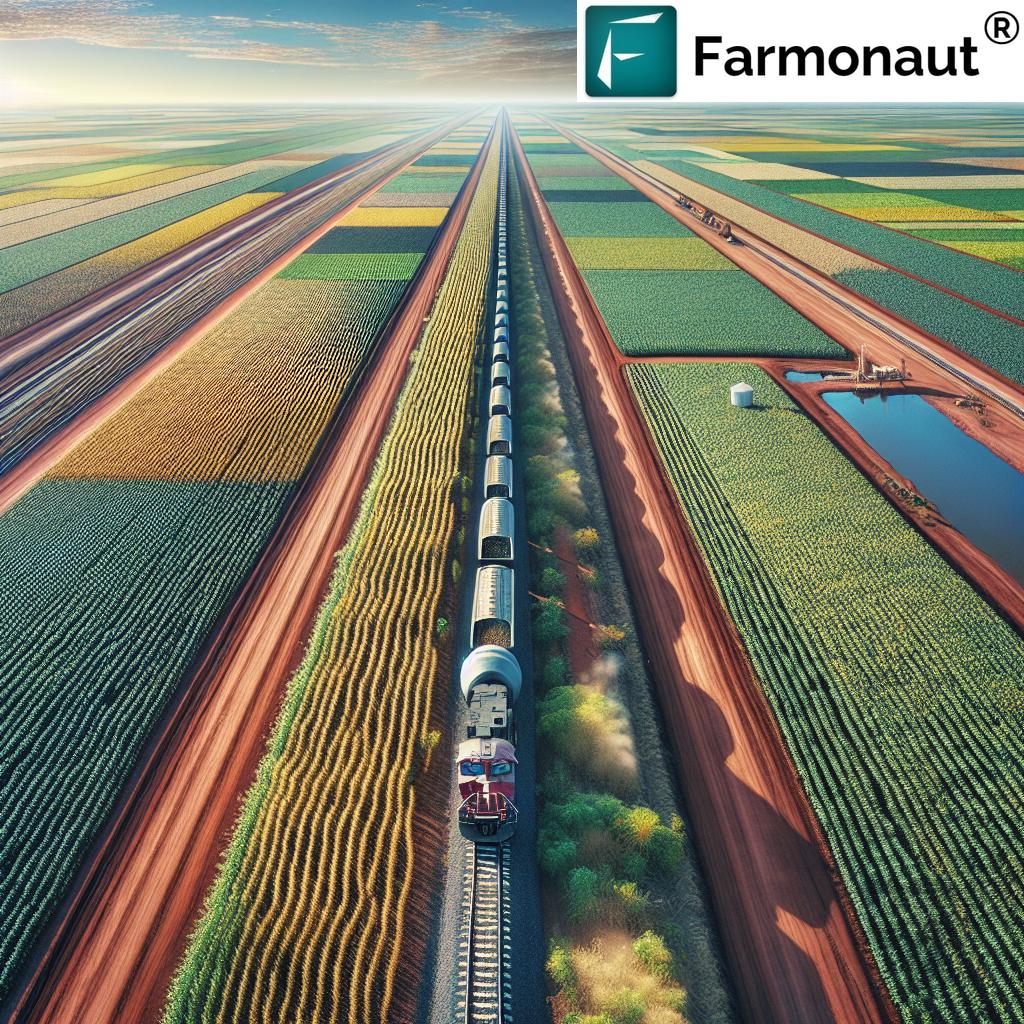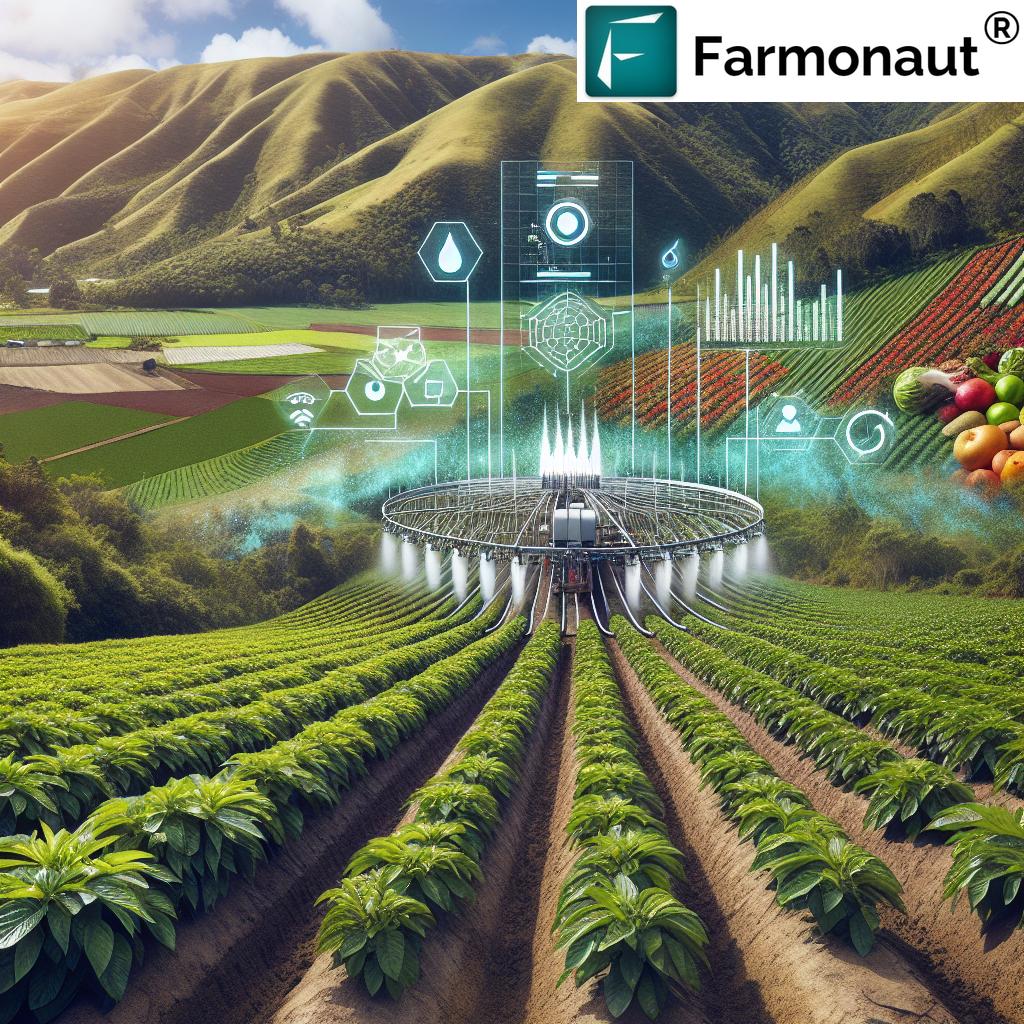Madeira River Crisis: Farmonaut’s Advanced Water Quality Monitoring Reveals Mercury Contamination in Brazil’s Amazon Basin
“Farmonaut’s study revealed alarming mercury levels in the Madeira River, a crucial Amazon tributary spanning 3,250 km.”
In the heart of Brazil’s Amazon Basin, a critical environmental crisis is unfolding along the Madeira River, one of the Amazon’s most significant tributaries. At Farmonaut, we’ve recently completed an extensive study using our advanced water quality monitoring technology to assess the health of this vital waterway. Our findings have revealed a deeply concerning situation: widespread mercury contamination and agricultural runoff are threatening both the river’s ecosystem and the communities that depend on it.
The Madeira River: A Lifeline Under Threat
The Madeira River, stretching over 3,315 kilometers, is not just a waterway; it’s a lifeline for countless species and communities in the Amazon Basin. This whitewater river plays a crucial role in the region’s biodiversity and economic stability. However, our recent environmental impact assessment has uncovered alarming levels of pollution that pose significant risks to both aquatic life and human health.
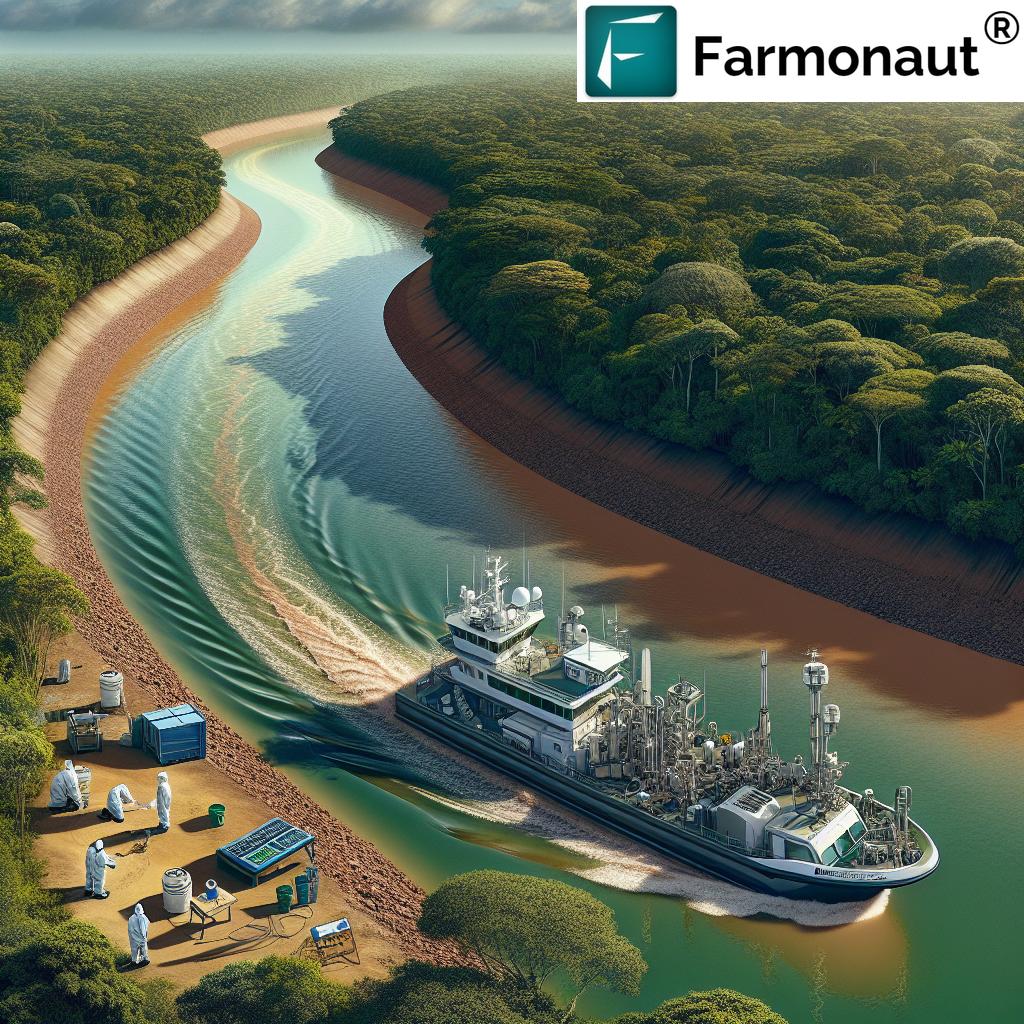
Farmonaut’s Cutting-Edge Monitoring Technology
At Farmonaut, we’re leveraging state-of-the-art remote sensing technology to revolutionize water quality monitoring in complex river systems like the Amazon Basin. Our satellite-based crop health monitoring system, originally designed for precision agriculture, has been adapted to track water quality parameters across vast stretches of river. This innovative approach allows us to gather comprehensive data on water contamination, sediment levels, and agricultural runoff with unprecedented accuracy and scale.
To explore how our technology can benefit your agricultural or environmental monitoring needs, check out our 
Key Findings from Our Madeira River Study
- Mercury Contamination: Our analysis detected mercury levels in the Madeira River that, while below Brazil’s health guidelines, are alarmingly high by global standards. This contamination is primarily linked to illegal gold mining operations upstream.
- Agricultural Runoff: We observed elevated levels of phosphorus and nitrogen, likely from agricultural activities in the region. This runoff contributes to water quality degradation and poses risks to aquatic ecosystems.
- Bacterial Contamination: Higher concentrations of fecal coliforms were found compared to other studied rivers, indicating potential sewage contamination issues.
- Sediment Load: The Madeira River showed significant sediment transport, which can affect water clarity and habitat quality for aquatic species.
Developing a Water Quality Index for Whitewater Rivers
One of the primary goals of our research is to develop a specialized Water Quality Index (WQI) for whitewater rivers like the Madeira. This index will take into account the unique characteristics of these river systems, including their naturally high sediment loads and distinct chemical compositions. By creating this tailored WQI, we aim to provide a more accurate and relevant tool for assessing and monitoring the health of whitewater rivers across the Amazon Basin and beyond.
“Illegal gold mining operations in the Amazon Basin contribute to over 100 tons of mercury pollution annually, threatening aquatic biodiversity.”
The Impact of Illegal Gold Mining
Our environmental data analysis has highlighted the severe impact of illegal gold mining operations on the Madeira River ecosystem. These activities introduce large quantities of mercury into the river system, which can have devastating effects on both wildlife and human populations.
- Mercury in the Food Chain: We found that predatory fish species, such as the pirarara, often exceeded safe mercury levels for human consumption. This bioaccumulation of mercury poses significant health risks to local communities that rely on these fish as a primary food source.
- Long-term Ecological Damage: Mercury contamination can persist in river sediments for decades, creating a long-lasting environmental hazard that affects the entire river ecosystem.
- Human Health Concerns: Exposure to methylmercury, a highly toxic form of mercury, can lead to serious neurological and developmental issues, particularly in children and pregnant women.
Agricultural Runoff: A Growing Concern
While mercury contamination from mining is a critical issue, our study also revealed significant challenges related to agricultural runoff. The Madeira River basin is home to extensive agricultural operations, and our water quality monitoring detected elevated levels of nutrients and pesticides entering the river system.
At Farmonaut, we believe that precision agriculture technologies can play a crucial role in mitigating this runoff. Our satellite-based crop monitoring system can help farmers optimize their use of fertilizers and pesticides, reducing the amount of these chemicals that end up in waterways.
For farmers and agricultural businesses interested in implementing sustainable practices, our mobile apps offer powerful tools for precision agriculture:
Aquatic Biodiversity Conservation Challenges
The Madeira River is renowned for its rich aquatic biodiversity, hosting numerous fish species, some of which are found nowhere else on Earth. However, our study has revealed several challenges to conserving this unique ecosystem:
- Habitat Degradation: Mercury contamination and increased sedimentation are altering river habitats, potentially affecting spawning grounds and food sources for many species.
- Chemical Stress: Elevated levels of pollutants place additional stress on aquatic organisms, potentially leading to reduced populations and altered ecosystem dynamics.
- Migration Barriers: While not directly related to water quality, we noted that hydroelectric dams along the river pose significant barriers to migratory fish species, further complicating conservation efforts.
Water Quality Comparison Table
| River Name | Mercury Concentration (ppb) | Agricultural Runoff Level | Water Quality Index Score (0-100) | Aquatic Biodiversity Impact | Estimated Health Risk to Communities |
|---|---|---|---|---|---|
| Madeira River | 0.8 | High | 65 | High | High |
| Negro River | 0.2 | Low | 85 | Low | Low |
| Tapajós River | 0.5 | Medium | 75 | Medium | Medium |
| Xingu River | 0.3 | Low | 80 | Low | Low |
| Purus River | 0.4 | Medium | 78 | Medium | Medium |
This table clearly illustrates the severity of the Madeira River’s contamination compared to other major Amazon tributaries. The higher mercury concentration, coupled with significant agricultural runoff, results in a lower Water Quality Index score and poses greater risks to both aquatic biodiversity and human health in surrounding communities.
Implications for Riverine Communities
Our research has significant implications for the communities living along the Madeira River. These populations, often reliant on the river for their livelihoods and daily needs, face several challenges:
- Health Risks: Consumption of contaminated fish and water poses serious health risks, particularly related to mercury exposure.
- Economic Impact: Declining fish populations and concerns about contamination can severely impact local fishing industries.
- Water Scarcity: In some areas, residents are increasingly resorting to purchasing water due to fears of river water contamination, placing an additional economic burden on these communities.
At Farmonaut, we believe that access to accurate environmental data is crucial for these communities to make informed decisions about resource use and health protection. Our water contamination detection technology can provide valuable insights to local authorities and community leaders.
The Role of Remote Sensing in Water Quality Monitoring
Our work on the Madeira River demonstrates the power of remote sensing technology in environmental monitoring. By using satellite imagery and advanced data analysis techniques, we can:
- Monitor vast stretches of river that would be impractical to survey using traditional methods
- Detect changes in water quality parameters over time, allowing for early identification of emerging issues
- Provide a comprehensive view of the entire river basin, including tributaries and surrounding land use
- Support data-driven decision-making for river ecosystem management
For those interested in leveraging our remote sensing capabilities for their own projects, we offer API access to our satellite and weather data. Learn more about our API services here: Farmonaut Satellite API
For detailed documentation on how to integrate our API into your applications, visit our API Developer Docs.
Balancing Economic Activities with Sustainable Practices
One of the most significant challenges facing the Madeira River region is balancing economic development with environmental protection. Our research highlights the need for sustainable solutions that can support local economies while preserving the river’s ecosystem. Some potential approaches include:
- Sustainable Agriculture: Implementing precision agriculture techniques to reduce runoff and optimize resource use
- Responsible Mining: Enforcing stricter regulations on mining operations and promoting mercury-free gold extraction methods
- Ecosystem Services: Developing programs that incentivize forest conservation and sustainable river use
- Green Infrastructure: Investing in natural water filtration systems and erosion control measures
At Farmonaut, we’re committed to supporting sustainable agriculture practices through our technology. Our precision agriculture tools can help farmers reduce their environmental impact while maintaining productivity.
The Path Forward: Recommendations for Action
Based on our comprehensive analysis of the Madeira River crisis, we recommend the following actions to address the water quality issues and protect both the ecosystem and local communities:
- Enhanced Monitoring: Implement a comprehensive, long-term monitoring program using remote sensing and in-situ measurements to track water quality trends over time.
- Stricter Enforcement: Strengthen enforcement of existing environmental regulations, particularly those related to mining and agricultural practices.
- Community Engagement: Develop educational programs to raise awareness about water quality issues and involve local communities in conservation efforts.
- Sustainable Agriculture Initiatives: Promote and support the adoption of precision agriculture techniques to reduce runoff and improve water quality.
- Restoration Projects: Initiate targeted ecosystem restoration projects, focusing on areas most affected by contamination and habitat degradation.
- Alternative Livelihoods: Develop programs to support alternative, sustainable livelihoods for communities currently dependent on activities that contribute to river pollution.
- International Collaboration: Foster collaboration between Brazil and neighboring countries to address transboundary water quality issues in the Amazon Basin.
Conclusion: A Call for Collaborative Action
The crisis facing the Madeira River is a stark reminder of the delicate balance between human activities and natural ecosystems. Our research has revealed the urgent need for action to address mercury contamination, agricultural runoff, and the myriad challenges threatening this vital waterway.
At Farmonaut, we believe that technology and data-driven insights can play a crucial role in finding solutions to these complex environmental issues. By combining our advanced remote sensing capabilities with on-the-ground expertise and community engagement, we can work towards a sustainable future for the Madeira River and the entire Amazon Basin.
We call on policymakers, researchers, local communities, and industry leaders to come together in a collaborative effort to protect and restore the Madeira River ecosystem. Only through concerted action and innovative solutions can we hope to preserve this invaluable natural resource for future generations.
Farmonaut’s Commitment to Environmental Sustainability
As we continue our work in the Amazon Basin and beyond, Farmonaut remains committed to developing and implementing technologies that support environmental sustainability. Our precision agriculture solutions, water quality monitoring tools, and data analysis capabilities are designed to help farmers, researchers, and policymakers make informed decisions that balance productivity with ecological responsibility.
We invite you to explore our suite of services and join us in our mission to promote sustainable practices in agriculture and environmental management:
FAQs
Q: How does Farmonaut’s technology contribute to water quality monitoring?
A: Farmonaut uses advanced satellite imagery and data analysis to track various water quality parameters over large areas. This allows for comprehensive monitoring of river systems, detection of pollution sources, and identification of long-term trends in water quality.
Q: Can Farmonaut’s agricultural solutions help reduce runoff into rivers like the Madeira?
A: Yes, our precision agriculture tools help farmers optimize their use of fertilizers and pesticides, which can significantly reduce agricultural runoff into nearby water bodies. By promoting more efficient resource use, we contribute to both improved crop yields and environmental protection.
Q: How accurate is satellite-based water quality monitoring compared to traditional methods?
A: While satellite-based monitoring may not match the precision of direct water sampling for all parameters, it offers unparalleled coverage and frequency of data collection. Our technology can detect many key indicators of water quality with high accuracy, providing valuable insights for further investigation and targeted sampling.
Q: What role can local communities play in addressing the Madeira River crisis?
A: Local communities are crucial partners in environmental conservation efforts. They can participate in water quality monitoring programs, adopt sustainable fishing and agricultural practices, and work with authorities to report illegal activities that may be harming the river ecosystem.
Q: How can policymakers use Farmonaut’s data to inform decision-making?
A: Our comprehensive environmental data analysis provides policymakers with valuable insights into the state of river ecosystems, agricultural practices, and land use patterns. This information can be used to develop evidence-based policies, target conservation efforts, and assess the effectiveness of environmental regulations.
By leveraging technology, fostering collaboration, and prioritizing sustainable practices, we can work towards a healthier future for the Madeira River and the communities that depend on it. At Farmonaut, we’re committed to being at the forefront of this crucial effort, providing the tools and insights needed to make informed decisions and drive positive change in river ecosystem management and environmental conservation.
